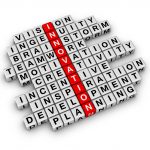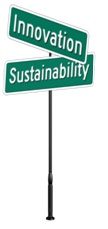Innovation and sustainability are two core values for EMC and for any truly forward-looking organization. After all, without innovation, companies risk stagnation, commoditization, and downright irrelevance in a world where change just continues to accelerate. Sustainability is equally important to any company’s future if it’s to have a talented and energized workforce, loyal customer base, and the resources it needs to conduct business.
And they need each other.
 First, some quick definitions. By “innovation”, I mean an original approach to solving a problem or achieving a goal. It may be a new discovery, but it could equally be a matter of putting old things together in new ways, or applying an existing idea to a new situation. The submissions to EMC’s eWaste EcoChallenge that were most compelling, for example, were ones in which someone recognized an analogous problem in a different field and adapted an existing solution to tracking eWaste.
First, some quick definitions. By “innovation”, I mean an original approach to solving a problem or achieving a goal. It may be a new discovery, but it could equally be a matter of putting old things together in new ways, or applying an existing idea to a new situation. The submissions to EMC’s eWaste EcoChallenge that were most compelling, for example, were ones in which someone recognized an analogous problem in a different field and adapted an existing solution to tracking eWaste.
“Sustainability” can mean different things to different companies, but at the very least, it’s about understanding the long-term consequences – good and bad – of our decisions, and making sure we’re not mortgaging the future for our business or our children by undermining the things we need to thrive.
 Sustainability needs innovation because conducting business in a way that that preserves the future means finding new ways of doing things – delivering IT services more efficiently, being more resilient to upheavals in health, finance, or the environment, growing our business faster than our energy use, reducing our dependency on scarce or hazardous materials, etc.
Sustainability needs innovation because conducting business in a way that that preserves the future means finding new ways of doing things – delivering IT services more efficiently, being more resilient to upheavals in health, finance, or the environment, growing our business faster than our energy use, reducing our dependency on scarce or hazardous materials, etc.
And innovation needs sustainability. Well, OK, maybe it doesn’t need it per se, but it sure can use it! Innovation happens at the intersection of diverse ways of thinking. And it happens when there is a passion and a purpose and a vision that people are trying to achieve. When that purpose brings together people from different disciplines, backgrounds, age groups, experience – then let the sparks fly!
There’s no question that clarity in an organization’s mission is absolutely the most important factor for would-be innovators to align around. But sustainability puts that company mission in the context of the world around us. It helps us understand why we’re doing what we’re doing – not only as employees, but as parents and citizens and neighbors. At EMC, we know that Cloud Computing can be a source of efficiency, adaptability, and resilience, and we are seeing applications of Big Data that are exposing new knowledge in human health, agriculture, and so much more. This awareness just enhances our pride in our work and our company, and is why we called this year’s EMC Sustainability Report “Transformation with Purpose“. This is not just hypothetical: the submissions to EMC’s internal Innovation Conference have shown how a shared worldview can bring together unexpected, organically-formed teams to deliver some really eye-popping new ideas.
But it’s possible these concepts are more than complementary. Innovation and Sustainability may just be converging.
On the one hand, once everyone is building environmental, social, and financial risk (and reward!) into their decisions, then the usefulness of all innovations will be judged partly by how sustainable they are – even if greater sustainability was not the primary objective of the idea.
Conversely, once we’ve plucked all the low-hanging fruit of sustainability – eliminating the obvious waste, improving efficiency, establishing principles of operation, base-lining our performance, making incremental improvements – there is nothing left but the really hard stuff. And tackling that will mean not doing what we do now a little better, but taking a completely new approach. And that requires nothing less than a company in which every employee believes in his or her power to make change.
I don’t really think the job of the Chief Sustainability Officer will go away anytime soon – there is too much changing too fast not to have someone trying to look around corners to see what’s coming.
But the day to day job of innovating for a sustainable future – that will simply be part of the fabric of any company that’s in it for the long term!